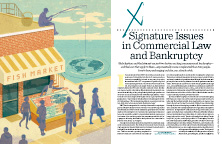Signature Issues in Commercial Law and Bankruptcy
Globalization and the Internet are just two factors making commerce and bankruptcy—and the laws that apply to them—exponentially more complicated than two people, face to face, exchanging cash for, say, a fresh catch.
Printer Friendly VersionIf you graduated from NYU School of Law more than 10 years ago, it’s likely that you think of commercial law courses as essentially focused on one area: how sales transactions in the U.S. are governed. Specifically, that meant studying the UCC, or Uniform Commercial Code. Oh, how things have changed. To be sure, students still intensely study the UCC and domestic contract issues. But the commercial world is shrinking. International transactions have soared dramatically, raising complicated global legal questions as deals are cut across countries with different legal systems. “Commercial law can no longer be thought of from a purely domestic perspective,” says Clayton Gillette, Max E. Greenberg Professor of Contract Law. “It’s no longer plausible in a law school curriculum to think of commercial law in that limited way.”
NYU Law has responded in a variety of innovative ways to prepare students for that new world. The school has beefed up classes on international sales law and arbitration; professors are reorienting their scholarship to look overseas and organizing conferences here and around the world to discuss international commercial law issues. Also on the agenda: the announcement this fall of a program allowing students to study abroad for a semester in Buenos Aires, Paris, or Shanghai.
An explosion in international trading isn’t the only big change in the commercial realm. The study of commercial law has increasingly expanded beyond business-to-business transactions to include those between business and consumers. That has meant a growing emphasis in both the classroom and research on contracts involving everything from credit cards to mortgages to cell phones. The boom in online transactions alone has raised a host of tricky and novel contractual questions about things like disclosure and privacy that are receiving intense focus from professors and students. The financial crisis led to a flood of high-profile bankruptcies—General Motors, Lehman Brothers, and Bernard L. Madoff Investment Securities, to name a few—each of which raised challenging and controversial issues. NYU Law professors have found themselves smack in the middle of the heated debates over the courts’ authority and the government’s role.
In each of these aspects of commercial law and bankruptcy, NYU Law can claim some of the nation’s preeminent faculty. Gillette and Franco Ferrari both delve deeply into commercial law. Kevin Davis has focused his recent contract law scholarship through the lens of developing countries. In the consumer credit area, Oren Bar-Gill and Ryan Bubb have separately and together taken aim at exploitative contracts involving credit cards, mortgages, and cell phones, among others. Florencia Marotta-Wurgler ’01 has concentrated her scholarship on contracts and privacy issues in the online world. The school recently hired Arthur Gonzalez (LL.M. ’90), who, as chief judge of the U.S. Bankruptcy Court for the Southern District of New York, presided over three of the largest bankruptcies in history: Enron, WorldCom, and Chrysler. He joins Barry Adler, one of the nation’s foremost bankruptcy scholars, and Troy McKenzie ’00, who is exploring questions about the limits of the powers of bankruptcy courts. The theoretical study of contract law is the province of Lewis Kornhauser, Liam Murphy, and Richard Epstein.
These scholars and practitioners are a lively, independent-thinking cohort, who don’t necessarily agree on either normative or prescriptive policies about contracts, commercial law, or bankruptcy. While Bar-Gill and Bubb, for instance, favor more contract disclosure regulation, Marotta-Wurgler questions its practicality and Epstein thinks government should not be the regulating authority.
“NYU has an unsurpassed portfolio of commercial law scholars, comprising leaders in the application of empirical, theoretical, and doctrinal analysis to commercial and consumer issues,” says George Triantis, a Stanford Law School professor and expert in commercial law, contracts, and bankruptcy. “The tradition of excellence in this field spans generations of scholars, keeping NYU School of Law at the cutting edge of the discipline.”
Contract Law Here and Abroad
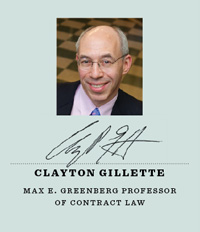 Clayton Gillette likes to tell his students the adage “If you give a person a fish, you feed him for a day; if you teach a person to fish, you feed him for a lifetime.” But then he tacks on an instructive twist: “If you teach a person how to buy and sell fish and open a fish market, you feed the person, the person’s family, employees, and customers.”
Clayton Gillette likes to tell his students the adage “If you give a person a fish, you feed him for a day; if you teach a person to fish, you feed him for a lifetime.” But then he tacks on an instructive twist: “If you teach a person how to buy and sell fish and open a fish market, you feed the person, the person’s family, employees, and customers.”
His message, in his words: “Commerce is the great mechanism for wealth creation and entrepreneurship.” Gillette hopes it especially resonates with students interested in developing countries. “Commercial law will bring both individuals and nations out of poverty,” he says. “I truly believe that.”
Gillette, who joined the NYU Law faculty in 2000 from the University of Virginia School of Law, does extensive work on domestic and international fronts. That’s reflected in his 2002 text, Sales Law: Domestic and International, co-written with Steven Walt. His recent domestic work has focused on whether standard form contracts tend to disfavor buyers. His argument: not necessarily, because market forces and the seller’s need to maintain his or her reputation will constrain bad contracts. He also presented a paper at a contractual innovation conference in May, organized by Kevin Davis and Florencia Marotta-Wurgler, that explored why some parties do not opt out of paying “consequential damages” in a contract, such as lost profits.
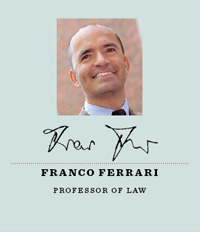 Professor Franco Ferrari, director of the Center for Transnational Litigation and Commercial Law, concentrates solely on international issues in commercial law and is widely considered one of the world’s experts on the topic, highly sought after by companies and lawyers eager for his advice. He has written 14 books and some 230 papers in French, German, Italian, English, and Spanish, oft cited by U.S. and German courts. In 2012 alone, he published two books: Internationales Vertragsrecht (International Contract Law), which he co-wrote and co-edited, and Contracts for the International Sale of Goods.
Professor Franco Ferrari, director of the Center for Transnational Litigation and Commercial Law, concentrates solely on international issues in commercial law and is widely considered one of the world’s experts on the topic, highly sought after by companies and lawyers eager for his advice. He has written 14 books and some 230 papers in French, German, Italian, English, and Spanish, oft cited by U.S. and German courts. In 2012 alone, he published two books: Internationales Vertragsrecht (International Contract Law), which he co-wrote and co-edited, and Contracts for the International Sale of Goods.
For two professors who well understand the importance of international trade, Gillette and Ferrari both describe themselves as “skeptics” of the uniform law governing worldwide sales transactions. Commonly known as CISG, the United Nations Convention on Contracts for the International Sale of Goods came into force in 1988 and was ratified by 78 countries at last count. Intended to promote trade and ease the worries of cross-border buyers and sellers, it sets up the rules that govern sales transactions between companies in different nations, such as when a deal is breached, what constitutes a change in a contract, and how disputes should be resolved.
“If you’re an American company buying shoes from Italy,” says Gillette, “you should understand, if nothing else, that your contract is not governed by the Uniform Commercial Code [which applies in the U.S.], and not by Italian domestic law, but is governed by this international sales law, CISG.”
While many observers hail CISG, Gillette thinks it could eventually fail for a variety of reasons. For one thing, he says, many of its provisions are vague and ambiguous, written not by commercial parties but by politicians more interested in reaching compromises than in setting up the clearly defined rules that businesses seek. “The upshot is a treaty whose provisions are likely to become less and less useful as time goes on,” he co-wrote (with Robert Scott) in a 2005 piece, “The Political Economy of International Sales Law,” for the International Review of Law and Economics.
Even the underlying notion of a worldwide uniform law bothers Gillette. “Just as we think competition for coffee leads to better coffee, so we think competition for law leads to better law,” he says. “There are benefits to be had when New York law competes with London law, which competes with French law, and parties have the ability to choose which law they want to apply to their transaction.”
The article was controversial among international scholars for obvious reasons. Gillette recalls how one of the drafters of CISG described the piece as “brilliant but flawed.” Laughing loudly, Gillette adds: “My view is he was half right.”
Ferrari falls roughly in the same camp as Gillette: Although the goal of uniform global law is worthwhile, it has been carried out poorly. “Unification is a myth up to now,” he declares, adding that it is filled with loopholes that lawyers can—and should— exploit. Indeed, much of his scholarship and outside consulting practice are devoted to debunking the myth and advising companies on how to take advantage of the loopholes.
One loophole he has widely written about is what he labels the “homeward trend.” Judges in the 78 countries are supposed to apply CISG uniformly, he says, “yet there’s no way a French judge applies the convention the same way as a U.S. judge.”
To take advantage of this loophole, he strongly advocates “forum shopping” as a way for companies to find courts that are more inclined to rule in their interest. He even teaches a seminar called Forum Shopping and International Commercial Law. “Forum shopping is, in my opinion, something lawyers have to do as an obligation to their client,” he says. “It is legal, no doubt. Those who hate it are those who can’t do it.”
Despite his gaming, or perhaps because of it, Ferrari doesn’t advocate junking CISG: “I believe that it’s a good thing, as long as you know what its defects are.”
Ferrari came to NYU Law full-time in 2010, and that year he created the Center for Transnational Litigation and Commercial Law. In addition to hosting visiting overseas lawyers and scholars, the center organizes conferences throughout the year at which discussion typically focuses on the different ways commercial law is applied internationally. In October 2011, for instance, the center, under the auspices of the United Nations Commission on International Trade Law, gathered 19 Italian academics in Milan to discuss the interpretation, applicability, jurisdiction, formation, and liability of international sales law.
Ferrari and Gillette collaborate frequently. In a 2010 article in International Commercial Law (Internationales Handelsrecht), “Warranties and ‘Lemons’ Under CISG Article 35(2)(a),” they tackled the question of what international standard to apply when determining whether a breach of warranty had taken place. They’ve also organized several conferences, including one in Florence a few years ago that gathered American and European scholars to talk about their approaches to commercial law. “European commercial law is more regulatory than American commercial law,” Gillette notes, while “Americans tend to begin from the proposition that the rules of commercial law should do for the parties what otherwise they would do for themselves.” He adds with a smile, “It was a full and frank discussion of a wide range of issues.”
Ferrari and Gillette are also mulling the idea of creating an encyclopedia of international sales law, around which they would organize a conference in Europe. “I like to do these in Europe because a lot of people who write on international sales law come from Europe,” Ferrari notes. It’s also a way, he says, to spread NYU Law’s expertise and to promote his own center.
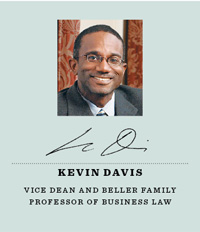 Kevin Davis, vice dean and Beller Family Professor of Business Law, teaches a highly popular course, Financing Development, which dissects how capital flows to developing countries. Students study specific transactions and contracts, from aid agreements to sovereign lending to private financing. “What I try to do is to think about how legal principles can be designed to take into account the broader public interest,” says Davis, who joined the NYU Law faculty in 2004 from the University of Toronto Faculty of Law.
Kevin Davis, vice dean and Beller Family Professor of Business Law, teaches a highly popular course, Financing Development, which dissects how capital flows to developing countries. Students study specific transactions and contracts, from aid agreements to sovereign lending to private financing. “What I try to do is to think about how legal principles can be designed to take into account the broader public interest,” says Davis, who joined the NYU Law faculty in 2004 from the University of Toronto Faculty of Law.
He’s especially interested now in anticorruption law. While much attention has been paid in recent years to the criminal side of overseas bribery, Davis is intrigued by the civil consequences of such acts. One question that he has explored in a working paper is this: If a company procures a contract through bribery, does it lose all rights to restitution and compensation?
A leading civil case sparked his interest. During a dispute between the Republic of Kenya and World Duty Free stores, it came to light that a representative of the stores had bribed Kenya’s president with $500,000 for approval to open stores there in 1989. The Kenyan government then voided the contract. World Duty Free sued, claiming Kenya had wrongly expropriated its property, and sought restitution. A panel of arbitrators sided fully with Kenya, ruling that claims based on contracts obtained by corruption cannot be upheld.
The decision is an example of the zero-tolerance approach: contracts obtained through bribery should be automatically made null and void with no restitution. But Davis advocates a different stance, which he calls proportional liability. “It takes into account the level of culpability of the firm,” he says, such as if it brought the situation to the attention of authorities. The problem with zero tolerance, says Davis, is that it leads to perverse incentives. Companies won’t come forth as readily or will lack incentive to undertake monitoring to self-report instances of bribery.
Consumer Credit—From Cell Phones to Credit Cards
Professor Oren Bar-Gill and Assistant Professor Ryan Bubb often work together on contract issues involving consumer credit. Each has an elite educational background, was an entry-level hire, and receives high praise from colleagues. Bar-Gill joined the faculty in 2005 and focuses on the law and economics of contracts and contracting. In 2011 he received a Young Scholars Medal from the American Law Institute recognizing his work in consumer contracts. Bubb came in 2010. His background is in political economy and government, and he had been a senior researcher at the Financial Crisis Inquiry Commission charged with investigating the causes of the economic meltdown.
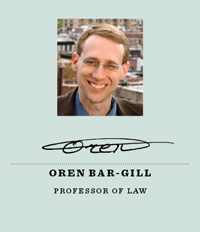 Bar-Gill’s early research contemplated business-to-business contracts between two sophisticated parties, he says. But his recent work has turned to studying consumer contracts— between “one sophisticated party, a seller, and a less sophisticated party, a consumer.” Here, he’s employing behavioral economics, a combination of economics and psychology, to try to understand how the contracts are designed and to what extent they harm consumers.
Bar-Gill’s early research contemplated business-to-business contracts between two sophisticated parties, he says. But his recent work has turned to studying consumer contracts— between “one sophisticated party, a seller, and a less sophisticated party, a consumer.” Here, he’s employing behavioral economics, a combination of economics and psychology, to try to understand how the contracts are designed and to what extent they harm consumers.
Consumers are “imperfectly rational,” and sophisticated sellers tend to design contracts to exploit that trait, he notes. This occurs in everything from contracts for cell phones to credit cards to mortgages, and when it happens it “hurts consumers and reduces total social welfare,” Bar-Gill asserts.
One anecdote he likes to relate to students involves the introduction of the second generation of Apple’s iPhone. It was advertised as cheaper because the upfront price was dropped from $400 to $200. Yet the two-year service contract raised the monthly fee from $60 to $70. “It’s no longer a cheaper iPhone,” he says. “It might be better, but it’s not cheaper.” The broader point, Bar-Gill says, is that sellers are taking advantage of buyers’ myopic tendencies to focus on the short run. “The purpose of the contract design is to create a wedge between the cost of the product as it is perceived by the consumer and the actual cost of the product,” he says. Bar-Gill elaborated on this in “Mobile Misperceptions,” a 2009 paper he co-authored for the Harvard Journal of Law & Technology. He and then-Furman Academic Scholar Rebecca Stone ’09 argued that cell carriers’ contracts played on consumer misperceptions of pricing plans.
Bar-Gill has identified two general features that are detrimental to consumers that show up time and again in contracts for cell phones, credit cards, and mortgages: One is a high level of complexity, the other cost deferral.
Both features permeated and contributed to the subprime mortgage meltdown, as he discussed in his 2009 Cornell Law Review article, “The Law, Economics, and Psychology of Subprime Mortgage Contracts.” Mortgages went from the relatively simple 30-year, fixed-rate note to complicated hybrid adjustable-rate mortgages, where the rate is fixed for, say, two years, then fluctuates every year. “The problem with complexity is that imperfectly rational borrowers can’t understand what they’re getting, and the complexity also allows the seller or lender to hide various costs in non-salient features,” Bar-Gill says.
 The cost-deferral problem arises when the initial mortgage rate for a hybrid is low yet jumps for the remainder of the term. “This ties into the myopia of consumers and optimism about how they might be able to make higher payments later on, and maybe they’ll be able to refinance their loans later on,” Bar-Gill suggests. Everyone knows how that played out.
The cost-deferral problem arises when the initial mortgage rate for a hybrid is low yet jumps for the remainder of the term. “This ties into the myopia of consumers and optimism about how they might be able to make higher payments later on, and maybe they’ll be able to refinance their loans later on,” Bar-Gill suggests. Everyone knows how that played out.
Is there a policy solution to complexity and cost deferral? The answer, he thinks, is coming up with a smart, sophisticated way to require companies to disclose all the costs, something the new Consumer Financial Protection Bureau is working on now. He advocates an “aggregate” disclosure—“a simple disclosure that imperfectly rational consumers can easily understand, which aggregates all the different price dimensions of the contract.”
Bar-Gill is active in trying to stimulate new ideas for consumer protection. In February he and Omri Ben-Shahar of the University of Chicago Law School organized a conference at NYU with the American Law Institute that explored regulatory techniques for enforcing consumer laws. Bar-Gill is also working to compile articles on consumer protection into a book, tentatively titled The Law, Economics, and Psychology of Consumer Contracts.
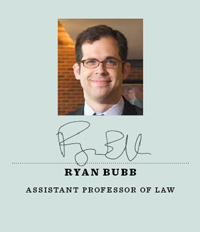 Other potential solutions to confusing and misleading credit resulted from an article Bubb and Bar-Gill wrote earlier this year for the Cornell Law Review titled “Credit Card Pricing: The CARD Act and Beyond.” They examined the impact of the 2009 law that overhauled regulations governing the credit card industry. The law, known as the CARD Act, cracked down on a variety of industry practices, such as raising the interest rate and sharply increasing fees when consumers went over their credit limits. Credit card companies complained that they would be forced to charge annual fees again, lower rewards programs, and make other changes to cover the lost revenue. But surprisingly, Bubb and Bar-Gill found that credit card companies in fact made none of those changes, even though revenues from late and over-limit fees dropped. “We saw no increase in annual fees, no change in the use of introductory interest rates,” Bubb says.
Other potential solutions to confusing and misleading credit resulted from an article Bubb and Bar-Gill wrote earlier this year for the Cornell Law Review titled “Credit Card Pricing: The CARD Act and Beyond.” They examined the impact of the 2009 law that overhauled regulations governing the credit card industry. The law, known as the CARD Act, cracked down on a variety of industry practices, such as raising the interest rate and sharply increasing fees when consumers went over their credit limits. Credit card companies complained that they would be forced to charge annual fees again, lower rewards programs, and make other changes to cover the lost revenue. But surprisingly, Bubb and Bar-Gill found that credit card companies in fact made none of those changes, even though revenues from late and over-limit fees dropped. “We saw no increase in annual fees, no change in the use of introductory interest rates,” Bubb says.
On the whole, Bubb thinks the CARD Act was for the good. “It increased consumer welfare and reduced issuer profits,” he says. Yet their paper also found that card companies haven’t changed their basic pricing structure much. They still offer low introductory interest rates, which entice consumers to make bad choices. So the authors proposed a counterintuitive solution: Go after the low prices; that is, ban abnormally low teaser interest rates. “They confuse consumers and have no plausible social function,” says Bubb. “They are just being used to lure in borrowers and confuse them about the cost of credit.”
Bubb admits to the difficulty in winning political support for such a proposal. “It’s like saying you can’t have a sale,” he says.
Internet Contracts: Does Anyone Read the Fine Print?
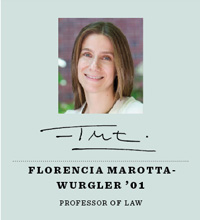 If consumers think credit card contracts are complicated, Professor Florencia Marotta-Wurgler can only shrug. She has focused her scholarship on contracts in the online world—where merchants literally have no limits as to how long and complicated they want to make their terms. Over time, she notes, online contracts have grown “ridiculously bigger and bigger” as they attempt to govern all aspects of online commerce—from privacy information to warranties to dispute resolution. This phenomenon was one reason she got interested in online contracts. Another was the wonder of how people buy just about anything from the comfort of their home and trust the transaction will take place. “I was thinking today,” she related during our interview, “that every single item of clothing I’m wearing, including my purse, was bought online. And everything went smoothly.”
If consumers think credit card contracts are complicated, Professor Florencia Marotta-Wurgler can only shrug. She has focused her scholarship on contracts in the online world—where merchants literally have no limits as to how long and complicated they want to make their terms. Over time, she notes, online contracts have grown “ridiculously bigger and bigger” as they attempt to govern all aspects of online commerce—from privacy information to warranties to dispute resolution. This phenomenon was one reason she got interested in online contracts. Another was the wonder of how people buy just about anything from the comfort of their home and trust the transaction will take place. “I was thinking today,” she related during our interview, “that every single item of clothing I’m wearing, including my purse, was bought online. And everything went smoothly.”
Raised in Buenos Aires, she attended the University of Pennsylvania and New York University School of Law. She joined the NYU faculty as an entry-level hire in 2006 and teaches Contracts and Internet Contracts.
In her research, Marotta-Wurgler attempts to discover, with intensive empirical study, whether online contracts, with their fine print and voluminous detail, tend to favor the sellers. That has long been the view of consumer advocates and some scholars, who figured that strong disclosure rules would help solve the problem. Turned out things aren’t so simple.
In one paper, she looked at so-called “Pay Now, Terms Later” contracts for software—meaning buyers didn’t get to see the terms until after forking over the purchase price and opening the box. This is common in software products sold in shrink-wrap packages.
Marotta-Wurgler studied about 800 contracts involving software products, of which half disclosed terms after the purchase and half before. She found that there was no difference between the two types in terms of their consumer-friendliness, as she wrote in her 2009 Journal of Legal Studies paper, “Are ‘Pay Now, Terms Later’ Contracts Worse for Buyers? Evidence from Software License Agreements.” She concluded that the amount of disclosure was unrelated to the terms of the contract and that regulation to ban these types of contracts would make little difference to consumers.
A related article looked at whether sellers in competitive markets offer more pro-consumer contracts versus sellers in concentrated markets, as one would imagine. There, too, Marotta-Wurgler found little difference among the contracts, as she detailed in “Competition and the Quality of Standard Form Contracts: An Empirical Analysis of Software License Agreements,” published in 2008 in the Journal of Empirical Legal Studies. In “‘Unfair’ Dispute Resolution Clauses: Much Ado About Nothing?” she also debunked the concern that anticonsumer dispute resolution clauses, such as mandatory arbitration and forum selection, were pervasive in online software contracts. That chapter appeared in the 2007 book Boilerplate: Foundations of Market Contracts.
It was clear, then, that disclosure mattered very little in online contracts. And the reason might be that almost nobody reads the contracts. So Marotta-Wurgler and a researcher set out to find some real data on the number of people who read online contracts, focusing on software products. Combing through a terabyte of data provided by online monitors Nielsen and comScore, she looked at the reading habits of 50,000 people. It was well-known that few people read online contracts, but her finding was astonishing: Only 0.1 percent read them. And these were sophisticated buyers of expensive software. (When Marotta-Wurgler testified in 2009 before a Senate committee on misleading Internet practices, Chairman Jay Rockefeller asked her twice to restate the percentage of people reading contracts to emphasize the point.)
Taken together, her empirical research is a yellow light to policymakers itching to legislate restraints on online contracts—restraints that could impose unnecessary costs.
The Power of Bankruptcy Courts
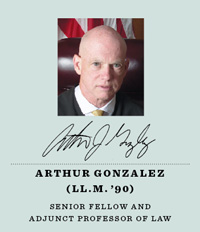 No one has had a better seat in the world of bankruptcy than Judge Arthur Gonzalez, who presided over the Enron, Chrysler, and WorldCom bankruptcies, three of the biggest in history. He retired from the bench in March 2012 and became a senior fellow at the Law School. Gonzalez is no stranger to NYU, having been an adjunct since 2008. He’s teaching several bankruptcy courses, as well as serving as faculty co-director (with Barry Adler) of the Lawrence P. King and Charles Seligson Workshop on Bankruptcy and Business Reorganization, which gathers top talent in the restructuring world, and the Galgay Fellows Program, which provides grants for students to work as summer interns in bankruptcy courts.
No one has had a better seat in the world of bankruptcy than Judge Arthur Gonzalez, who presided over the Enron, Chrysler, and WorldCom bankruptcies, three of the biggest in history. He retired from the bench in March 2012 and became a senior fellow at the Law School. Gonzalez is no stranger to NYU, having been an adjunct since 2008. He’s teaching several bankruptcy courses, as well as serving as faculty co-director (with Barry Adler) of the Lawrence P. King and Charles Seligson Workshop on Bankruptcy and Business Reorganization, which gathers top talent in the restructuring world, and the Galgay Fellows Program, which provides grants for students to work as summer interns in bankruptcy courts.
NYU Law students of bankruptcy wanting to connect the theoretical with the practical need look no further than to Gonzalez. “One of the goals here,” he says, “is to be available to students, explore ideas of clinical programs, and also to give students some practical view of what they are learning and how it plays out.”
Gonzalez had an unusual career path. He taught in New York City schools for 13 years before switching to law. He received a J.D. from Fordham University School of Law in 1982 and an LL.M. in taxation from NYU Law in 1990. After working for a while for the Internal Revenue Service and in private practice, he eventually was appointed to the Bankruptcy Court in 1995. He was reappointed to another 14-year term in 2009 but decided, he says, that he “really wanted to do more teaching.” (The court keeps him close, however. In July, Gonzalez was named the independent examiner investigating details of the $4 billion bankruptcy of home lender Residential Capital.)
This semester Gonzalez is teaching Bankruptcy; in the spring he will teach a course in cross-border insolvency laws, and another that concentrates on large corporate reorganizations like Enron and WorldCom. He won’t need a textbook for that one.
Enron was not only “fascinatingly complex,” Gonzalez recalls, but also wrapped in a “Hollywood aspect, a political aspect, and an investigatory aspect.” His challenge was to conduct hearings and “insulate them from what was going on outside of the courtroom,” he says. He’s proud that creditors got maximum value even while the company was being investigated on numerous fronts.
Judging from the rhetoric in this year’s presidential campaign, Gonzalez’s handling of the Chrysler bankruptcy was by far his most controversial. Republican candidates insisted it was an unprecedented abuse of the normal procedures of bankruptcy law. They argued it disregarded the rights of secured creditors and blocked other, nongovernment bidders in order to get the company up and running quickly. Gonzalez responds that the government never would have agreed to fund a full, planned reorganization, which could have taken up to a year to complete. Instead, the quick sale that he allowed lasted only 41 days. “Some people argued the government was bluffing, that it would not pull the plug on the funding, so I should go through with a full planned process,” Gonzalez recalls. “I took the position that the record was supported by the notion that the government meant what they said.”
 His colleague Barry Adler, Bernard Petrie Professor of Law and Business, was among the bankruptcy scholars who also found fault with the way the process was handled. “Judge Gonzalez streamlined the proceeding and saved the company and maybe saved the economy,” says Adler, “but he did it in a way, in my view, that the bankruptcy law shouldn’t have permitted him to do.”
His colleague Barry Adler, Bernard Petrie Professor of Law and Business, was among the bankruptcy scholars who also found fault with the way the process was handled. “Judge Gonzalez streamlined the proceeding and saved the company and maybe saved the economy,” says Adler, “but he did it in a way, in my view, that the bankruptcy law shouldn’t have permitted him to do.”
He argues that Gonzalez should have opened up the bidding more fully to better judge the real value of Chrysler. He says neither he nor anyone else could have predicted what would have happened with a full proceeding, but his bottom line is this: Judges shouldn’t “mess with” the rights of creditors.
In 2009, Adler was invited to speak before an oversight committee looking into the Troubled Asset Relief Program’s role in the auto industry bailout. Adler recalls wryly: “The Republicans wanted me to say secured creditors were cheated, and the Democrats wanted me to say they were not. I would say neither. And no one was happy.” As he summed up in a 2010 article in the American Bankruptcy Institute Law Review, the GM and Chrysler bankruptcies were “no doubt interesting. But the law that they produced may be more curse than blessing.”
Adler joined the NYU Law faculty in 1996. He had previously taught law at the University of Virginia, Emory University, and George Mason University. It was at Emory, in 1993, where Adler wrote an article on bankruptcy that first got him noticed in the academic world. And now, 20 years and a financial meltdown later, the ideas he advocated then are “oddly enough,” as he puts it, back in vogue. (Alas, he’s not always cited.)
The article, “An Equity-Agency Solution to the Bankruptcy-Priority Puzzle” in the Journal of Legal Studies, proposed a rapid-fire way for companies in financial distress to reorganize and avoid the time and expense of a typical bankruptcy proceeding. He called it “chameleon equity”—a phrase that didn’t stick. Today the strategy is called a bail-in (as opposed to a bailout, of course).
Bankruptcy is usually a cumbersome process in which shareholders and creditors argue over the value of a company, which the judge ultimately decides. Adler insisted in the article that the valuation process is unnecessary. When a company can’t cure a debt, there should follow an automatic transformation of its capital structure (one that the parties agreed to in the original contract). The equity shares disappear, the junior debt turns into new equity, and the senior debt is reinstated as whole.
Fast-forward to the 2008 financial crisis, and now scholars and the popular press are advocating the bail-in idea. It would be especially valuable to save large financial institutions, where a restructuring process is required literally overnight to stave off a run on their assets. Adler is writing a book on the subject, after having co-written a chapter on the idea in the 2010 book Regulating Wall Street: The Dodd-Frank Act and the New Architecture of Global Finance, published by the NYU Stern School of Business.
Adler’s work in contracts tends to tilt more toward the theoretical. In a 2008 article in the NYU Law Review, he analyzed the long-held theory of efficient breach—the notion that it’s legally OK for a party to breach a contract as long as the victim is compensated. But he turned the question on its head, looking at cases in which the person who breaches the contract actually benefits the other party rather than injures it. The law now says a person who breaches a contract cannot sue the victim to gain those benefits, known as negative damages. Using economic analysis, Adler suggested that, in fact, allowing negative damages might be beneficial in certain cases, though not all. He aptly called his article “Efficient Breach Theory Through the Looking Glass.”
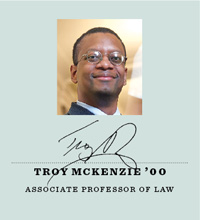 Nestled in a pile of papers on Associate Professor Troy McKenzie’s desk is, as he describes it, “a nice letter” from the chief justice of the United States. In it Justice Roberts appointed McKenzie a reporter, or academic adviser, to the committee on bankruptcy for the Judicial Conference of the United States. The committee serves to consider changes to the nation’s bankruptcy rules. That’s not a bad honor for a guy who originally planned on becoming a chemical engineer, his major at Princeton University. He joined the Law School faculty as an entry-level hire in 2007. With a laugh, he says he might get around to framing the letter.
Nestled in a pile of papers on Associate Professor Troy McKenzie’s desk is, as he describes it, “a nice letter” from the chief justice of the United States. In it Justice Roberts appointed McKenzie a reporter, or academic adviser, to the committee on bankruptcy for the Judicial Conference of the United States. The committee serves to consider changes to the nation’s bankruptcy rules. That’s not a bad honor for a guy who originally planned on becoming a chemical engineer, his major at Princeton University. He joined the Law School faculty as an entry-level hire in 2007. With a laugh, he says he might get around to framing the letter.
McKenzie’s scholarship on bankruptcy has taken him in several directions. One involves exploring how bankruptcy courts handle mass torts and similar complex litigation—and how they can become a litigation resolution device. McKenzie argues in a forthcoming paper, “Toward a Bankruptcy Model for Non-Class Aggregate Litigation,” that bankruptcy courts can do a better job than regular courts in dealing with aggregating mass tort cases.
He is also delving into questions about the role and powers of bankruptcy courts and judges. It’s particularly timely, as bankruptcy judges have played prominent roles during the recession, in everything from Lehman Brothers to mortgage foreclosures to the bankruptcy reorganizations of General Motors and Chrysler. Yet as they exercise those broad powers, McKenzie notes, they enjoy neither of the twin protections that regular federal judges receive under Article III of the Constitution: life tenure (their terms are for 14 years) and compensation that cannot be diminished. To some commentators, that structure threatens to undermine the protection of an independent judiciary under the separation of powers doctrine.
McKenzie wrote about this conundrum in a 2010 Stanford Law Review article, “Judicial Independence, Autonomy, and the Bankruptcy Courts.” He concluded that the current system for bankruptcy judges works for the most part. The Supreme Court has dealt with this issue in numerous cases, most recently in the highly publicized matter involving Anna Nicole Smith, the former Playboy Playmate who was widowed after a brief marriage to J. Howard Marshall II, a former Yale Law School professor turned wealthy Houston oilman.
“Most people don’t realize this is quite an important case about bankruptcy,” says McKenzie. “The question is, what kinds of decisions can bankruptcy judges decide and enter, and what kinds of decisions do they have to leave to district judges?”
 The Supreme Court ruled 5–4 that Smith’s estate (she died in 2007) was not entitled to a portion of Marshall’s $1.6 billion fortune. A federal bankruptcy judge had earlier ruled in her favor, while a Texas probate judge had sided with one of Marshall’s sons. The Supreme Court ruled in 2011 that the bankruptcy court did not have the authority to decide her claims against Marshall, citing constitutional issues including the lack of lifetime tenure.
The Supreme Court ruled 5–4 that Smith’s estate (she died in 2007) was not entitled to a portion of Marshall’s $1.6 billion fortune. A federal bankruptcy judge had earlier ruled in her favor, while a Texas probate judge had sided with one of Marshall’s sons. The Supreme Court ruled in 2011 that the bankruptcy court did not have the authority to decide her claims against Marshall, citing constitutional issues including the lack of lifetime tenure.
McKenzie, who is working on an article about this case, is critical of the decision on grounds it draws an “artificial line” for determining the powers of bankruptcy judges. In doing so, he contends, the Court has opened questions about whether bankruptcy judges can enter final judgments in even bread-and-butter cases. In the Bernard Madoff scandal, for instance, a bankruptcy trustee is trying to recover money under the Fraudulent Conveyance Provision. That’s a common practice in bankruptcy cases, McKenzie says, yet the Court’s decision in Stern v. Marshall now casts doubt on its validity.
For his part, Gonzalez doubts that the decision will amount to much. He expects future rulings to favor keeping cases with bankruptcy courts and allow them to enter final rulings. Besides, he argues, separate bankruptcy courts provide a valuable service. It would be “extremely difficult” for a federal district judge to oversee the lengthy and continual demands of a Chapter 11 reorganizational filing, for instance, while ensuring speedy trials in other cases.
The Theoretical Approach
Lewis Kornhauser, Liam Murphy, and Richard Epstein have played important roles in a long-running theoretical debate about the fundamental purpose of contract law. The dominant theory has varied over the years as one camp or another takes hold, alternating between an economic view and one more based in moral theory, with various shades of gray thrown in. Contract law is about making commerce efficient, argued one view. No, it’s about preventing harm and compensating people for unfair losses, said another. No, it’s about enforcing promises, said yet another. Today, the economic theory still reigns, even as advocates of the philosophical foundations of contract law have reemerged to challenge that view.
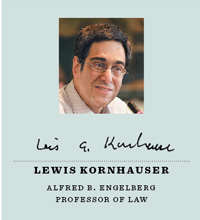 Lewis Kornhauser, Alfred B. Engelberg Professor of Law who joined the faculty in 1982, was one of the earliest scholars to write on the idea of using economic analysis to analyze contractual issues. Not surprising, given his economic bent including a J.D. and Ph.D. in economics from the University of California, Berkeley. Economic analysis had already crept into other areas of law, especially torts, in the 1960s and ’70s. In his 1983 dissertation, published in the Journal of Law & Economics, he used economics to explore how nonlegal matters, like a seller’s reputation, could serve as a substitute to enforce contracts and determine remedies for breach. It’s a simple idea, but very little was written using such analysis back then, Kornhauser notes. His paper, “Reliance, Reputation, and Breach of Contract,” is peppered with equations. Kornhauser later wrote a half-dozen other contract papers, each looking through the economic prism, including “An Introduction to the Economic Analysis of Contract Remedies” in the University of Colorado Law Review in 1986. Written as a survey of literature for lawyers, it was, he says, an effort to “propagate the faith” of economic analysis in contract law.
Lewis Kornhauser, Alfred B. Engelberg Professor of Law who joined the faculty in 1982, was one of the earliest scholars to write on the idea of using economic analysis to analyze contractual issues. Not surprising, given his economic bent including a J.D. and Ph.D. in economics from the University of California, Berkeley. Economic analysis had already crept into other areas of law, especially torts, in the 1960s and ’70s. In his 1983 dissertation, published in the Journal of Law & Economics, he used economics to explore how nonlegal matters, like a seller’s reputation, could serve as a substitute to enforce contracts and determine remedies for breach. It’s a simple idea, but very little was written using such analysis back then, Kornhauser notes. His paper, “Reliance, Reputation, and Breach of Contract,” is peppered with equations. Kornhauser later wrote a half-dozen other contract papers, each looking through the economic prism, including “An Introduction to the Economic Analysis of Contract Remedies” in the University of Colorado Law Review in 1986. Written as a survey of literature for lawyers, it was, he says, an effort to “propagate the faith” of economic analysis in contract law.
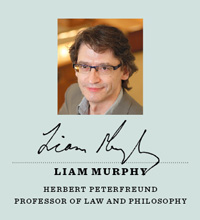 Murphy, Herbert Peterfreund Professor of Law and Philosophy, entered the debate a few years later and remains today the self-described philosopher of the contract faculty. “My connection is primarily foundational, theoretical, philosophical,” he says. While teaching Contracts to 1Ls, he keeps abstract theory to a minimum. But his Contract Theory seminar is where he lets loose on teaching contract doctrine from a theoretical point of view.
Murphy, Herbert Peterfreund Professor of Law and Philosophy, entered the debate a few years later and remains today the self-described philosopher of the contract faculty. “My connection is primarily foundational, theoretical, philosophical,” he says. While teaching Contracts to 1Ls, he keeps abstract theory to a minimum. But his Contract Theory seminar is where he lets loose on teaching contract doctrine from a theoretical point of view.
Murphy agrees with central ideas from the economic camp—that the role of the law of contracts is to promote mutually beneficial transactions. But he believes that economic theory doesn’t capture all the aims of contract law, that it requires philosophical underpinning. It is especially important, he says, that contract law not conflict with commonsense ethical ideas about keeping promises. For example, contract remedies should be in line with the simple idea that promises should, all things equal, be performed. If they are not, the practices of both contract and promise are likely to be weakened.
Still, Murphy doesn’t go as far as the theory that Charles Fried, the former solicitor general and now Harvard Law professor, laid out in his 1981 book, Contract as Promise. Injecting morality into the debate, Fried argued that contract law is about enforcing a moral obligation to keep promises. In “Contract and Promise,” which appeared in the Harvard Law Review Forum in 2007, Murphy suggested a more nuanced view. While the “morality of promise” is relevant to understanding the purpose of contract law, he argued, he disagreed with Fried’s more stringent notion that contract law is about enforcing the moral obligation to keep promises for their own sake. Murphy is working on a book on contract theory that will include this debate as well as issues such as the basis of the obligation to keep promises. As is usual in his philosophical world, the answer “is rather more elusive than you might have thought,” he says.
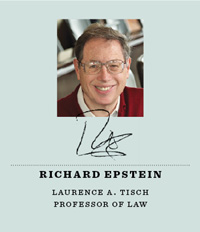 There are few areas in commercial law (or all of legal scholarship, for that matter) that the prolific Epstein, Laurence A. Tisch Professor of Law, hasn’t written about. He has tackled contracts, bankruptcy, consumer credit, cyberspace issues—you name it. But his heart and head appear most obsessed by issues involving contracts, the “most generic” area in commercial law, as he puts it. Epstein’s work on contracts often focuses on the practical question of whether contracts are better than other structures for creating agreements and understanding. Well known for his libertarian views, he is consistent on that issue: Contracts work a heck of a lot better than government regulations or torts, in everything from malpractice to antitrust, from labor law to securities regulation.
There are few areas in commercial law (or all of legal scholarship, for that matter) that the prolific Epstein, Laurence A. Tisch Professor of Law, hasn’t written about. He has tackled contracts, bankruptcy, consumer credit, cyberspace issues—you name it. But his heart and head appear most obsessed by issues involving contracts, the “most generic” area in commercial law, as he puts it. Epstein’s work on contracts often focuses on the practical question of whether contracts are better than other structures for creating agreements and understanding. Well known for his libertarian views, he is consistent on that issue: Contracts work a heck of a lot better than government regulations or torts, in everything from malpractice to antitrust, from labor law to securities regulation.
“There are many obstacles to contracting, but the obstacles are always greater from direct government coercion,” he contends.
Epstein, who joined the NYU Law faculty full-time in 2010 after five years of alternating semesters between the University of Chicago and NYU, teaches Contracts to 1Ls. He tends to structure the class into three major themes. One is to teach contract doctrine, which “they really have to know.” This involves centuries- old issues such as the rules of consideration, what promises are enforceable, the meaning of conditions, and knowing when contracts are completed, among many others. Another leg of his class scrutinizes deals that were litigated and figures out why they went awry and how that could have been avoided. The third is to discuss the scope of the law of contracts.
On that point, he says students often ask about the limits of contracts, in doctrines such as unconscionability and contracts against public policy. “There is a temptation to limit the scope of the field and to say some form of direct regulation is necessary,” he says.
In all of these signature issues of commercial law and bankruptcy, it is easy to get lost in the details. That’s why Clay Gillette’s office is adorned with gorgeous pictures of his visits to Kenya and other emerging nations, where he often comes upon people buying stuff in marketplaces. They are a reminder of his heartfelt views about marketplaces and the law. Marketplaces improve people’s lives, he says flatly. “And the objective of commercial law is to facilitate well-operating markets—to ensure that they operate in a way that leaves buyers and sellers both better off.” That’s about as good a definition of commercial law as you could find.
—Larry Reibstein is a New York-based journalist.

